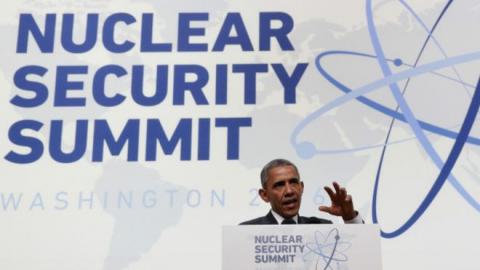Nuclear security summit in Washington
For the first time, the assembled world leaders were to participate in a simulation exercise at the summit to test how they might respond to a potential nuclear terrorist threat. The possibility that people associated with Islamic State were surveilling an official at a Belgian nuclear facility raised alarm after last week’s bombings in Brussels about the terrorist network’s goals. Obama reiterated Friday, though, that no terrorist group has obtained a nuclear weapon.
But counter-terrorism was not the primary goal of the summit process Obama launched in 2009. Rather, he sought to gain commitments from countries to reduce or eliminate altogether stockpiles of weapons-usable nuclear materials, or build new safeguards against theft. And experts say significant progress has been made toward those goals.
The White House also praised the creation of centers in several countries that train nuclear professionals at international standards and noted that 2005 amendments to an international agreement on protecting nuclear material are on track to come into force after ratification in additional nations.
An analysis by the Nuclear Threat Initiative noted that 24 countries have such supplies of highly enriched uranium or separated plutonium that could be used in nuclear weapons, down from 35 at the start of Obama’s administration. But six nations are actually increasing their supplies, including isolated North Korea as well as Pakistan. In addition, deteriorating U.S.-Russia relations have resulted in lapses in cooperation on reducing nuclear materials.
The decision of Russian President Vladimir Putin not to attend the summit raised concerns among nuclear-energy experts. Russia possesses half the world’s nuclear weapons and half the world’s nuclear-use materials. It was also the destination for the enriched uranium that Iran agreed to get rid of as part of its landmark nuclear deal last year. Putin’s absence “creates a big hole,” said William H. Tobey, senior fellow at Harvard University’s Belfer Center for Science and International Affairs.
He outlined several worrisome problems with Russia’s nuclear-security program, including two recent 10% cuts in the Russian federal budget, aging equipment and endemic corruption and organized crime. The Russian nuclear regulatory agency recently responded to budget cuts by keeping personnel but cutting travel, meaning inspectors cannot go to the plants they should be inspecting, he said. “Maintenance has not been a hallmark of Russian management,” Tobey said.
Another growing concern, he said, is the rise in Islamic fundamentalism in parts of Russia, including the Caucasus region and, more recently, the Urals, which is also home to some of the country’s most sensitive nuclear installations.
Obama administration officials insisted that good progress has been made in potential “hot spots” where nuclear material could potentially represent a threat, including India and Pakistan. “We won’t stop worry about this and 100 other things in the nuclear world … but there has been progress,” said Thomas Countryman, assistant secretary of State for international security and nonproliferation.
Obama deserves credit for elevating the issue of nuclear security, which itself produced tangible accomplishments, said Joseph Cirincione, president of the Ploughshares Fund, a nonproliferation advocacy group. Ukraine’s removal of all of its highly enriched uranium years before its current instability is “the poster child for the success of this effort.”
But it has also faltered in the face of what he called the “three Rs” – Russia, Republicans who’ve stood in the way of efforts like the Iran deal, and resistance even within the Obama administration to fully implementing the president’s goals, particularly at the Pentagon. “He had a very ambitious agenda,” Cirincione said. “The vision was correct. His analysis of the danger was correct. It was just much harder than he thought it was going to be.”
One of the biggest questions coming out of the summit is whether the enterprise Obama helped establish will outlive his administration, and not only because the Republican front-runner to succeed him, Donald Trump, suggested this week that some U.S. allies might consider attaining nuclear weapons of their own, a view that White House aides slammed as a potentially “catastrophic” change in U.S. position.
Bonnie Jenkins, a coordinator for the Obama administration’s threat reduction programs, said it was possible that the next president, along with other countries, might continue the nuclear-security process. “The lingo we are using is that this is the last summit in its current format,” she said.
Michael A. Memoli and Tracy Wilkinson

